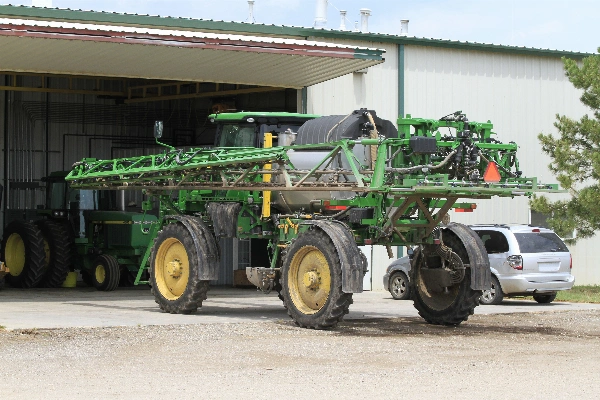As the Summer harvesting month comes to an end and the winter conditions settle in, farmers turn their attention to a crucial task, preparing their agricultural machinery for the cold months ahead. At AMTEC, we understand that proper winter preparation is not just about maintaining agricultural equipment—it's about protecting your investment and ensuring a smooth start to the next farming season.
Our team of experts, with decades of experience in the agricultural machinery sector, has compiled this comprehensive guide to help you winterise your farm equipment effectively. Whether you're working with machinery you've purchased through our service or maintaining your existing fleet.
The Importance of Winter Preparation for your Agricultural Machinery
Winter can be harsh on farm machinery. The combination of cold temperatures, moisture, and periods of disuse can lead to a host of problems, from rust and corrosion to seized engines and cracked components. By taking the time to properly prepare your equipment, you're not just avoiding potential repair costs; you're extending the lifespan of your machinery and ensuring it's ready to perform when you need it most.
Tailored Care for Different Types of Machinery in preparation for Winter
Every piece of farm equipment has its own specific needs when it comes to winter preparation.
Preparing Drills and Combines for Winter
Drills and combines require particular attention to detail. These agricultural machineries often have residual seeds left in their mechanisms after the harvest. It might seem harmless, but these seeds can attract mice and other rodents seeking shelter from the cold. These unwanted guests can wreak havoc, chewing through seed wheels, hopper covers, and even electrical wiring. The solution? A thorough, deep clean. Take the time to remove every last seed, paying special attention to hard-to-reach areas. In high problematic areas of high damage, some farmers resort to using rat bait/ poison and traps while the machine is stationary for long periods of time. Your future self will thank you when spring arrives, and you're not faced with unexpected repairs.
Preparing Tractors and Telehandlers for Winter
For tractors and telehandlers, the focus should be on three key areas: electrics, fluids, and protection. Start with the battery—cold weather can be particularly hard on batteries, so ensure they're in top condition, fully charged and isolate the batteries when not in use. Next, check all fluid levels, paying particular attention to the transmission fluid. Top up where necessary, using the appropriate grade for winter conditions and use anti-freeze in the water. Finally, consider applying a protective wax coating to exposed metal surfaces. This extra layer of protection can make a significant difference in preventing rust and corrosion during the damp winter months.
Preparing Fertiliser Spreaders, Sprayers, and Grain and Fertiliser Drills for Winter
Fertiliser spreaders, sprayers, and grain and fertiliser drills present their own unique challenges. The residue left from fertilisers and other chemicals can be highly corrosive, especially when combined with moisture. If left unchecked, this residue can eat through metal and wiring, causing extensive rusting, seizeing up moving parts and electrical faults. The key here is thorough cleaning. Use a pressure washer to remove all traces of fertiliser and chemical residue. Once clean and dry, apply a layer of protective oil to vulnerable parts. This two-step process—clean, then protect—is crucial for preserving the integrity of this equipment.
Preparing Power Harrows and Rolls for Winter
Smaller equipment, such as power harrows, often ends up stored outside due to space constraints. If this is the case on your farm, there are steps you can take to minimise damage. Elevating the equipment on pallets keeps it off the damp ground, reducing the risk of rust and rot. Additionally, keep the grass around stored machinery short. This simple step deters rodents from making their winter homes in your equipment and makes it easier to move the machinery when needed.
Don't forget about your rolls. These might seem like simple pieces of equipment, but they too need attention before winter storage. Check the tyres, replacing any that show signs of significant wear. Inspect the rings and other metal components, replacing any that are damaged. Finally, a thorough greasing of all moving parts will ensure they're ready to roll when the new season begins.
General Agricultural Machinery Winter Preparation Strategies
Beyond the specific needs of individual machines, there are several general strategies that apply across the board when preparing farm machinery for winter:
- Dry and ventilated storage:
- Ideal to store machinery in a barn or shed for protection from winter weather
- If indoor storage isn't possible, thoroughly grease the machine and use good quality, waterproof tarpaulins
- Ensure covers are securely fastened to withstand winter wind
- Lubrication:
- Crucial for preventing rust and corrosion
- Pay special attention to moving parts and areas where different metals contact
- Use a high-quality, winter-grade lubricant
- Apply lubricant to a cold machine then run it up for 5 minutes to evenly distribute the lubrication around all the bearings to avoid pitting
- Fuel anti-wax additive:
- Consider using if planning to operate machinery during winter
- Co-crystallises with fuel wax crystals, changing the fuel's chemical structure
- Allows fuel to flow freely in cold temperatures, ensuring smooth engine operation
- Drain fluids:
- For dormant equipment, drain fluids that might freeze
- Prevents cracked pipes and engine damage
- Consult machinery manual if unsure which fluids to drain
- Battery care:
- For unused machinery, consider removing batteries and storing in a warm, dry place
- Disconnect the earth lead first when removing batteries
- Regularly charge stored batteries throughout winter
- Tyre maintenance:
- Properly inflate tyres to prevent flat spots during long periods of disuse
- Check inflation levels and adjust as needed
- Ensure tyres meet legal standards for road use if applicable
- Thorough equipment check:
- Use winter preparation as an opportunity to inspect all equipment
- Check for wear and tear
- Identify parts needing replacement before the spring season
- This proactive approach prevents breakdowns during critical farming periods
The AMTEC Advantage
At AMTEC, we don't just sell used agricultural machinery—we provide expertise. Our team understands the unique challenges faced by farmers in preparing for and working through the winter months. When you're in the market for additional or replacement equipment, we're here to help you find machinery that not only meets your immediate needs but is also well-suited to your specific winter storage and usage conditions.
Moreover, our expertise extends beyond the point of sale. We're always available to offer advice on maintaining and preparing your machinery, whether you purchased it through us or not. Our goal is to support the farming community by ensuring you have the knowledge and resources to keep your equipment in top condition year-round.
As you prepare your farm machinery for the winter months, remember that preventative effort now can save significant time, money, and stress later. By following these guidelines and leveraging the expertise available through AMTEC, you're not just winterising your equipment—you're investing in the future productivity of your farm. With proper preparation, your machinery will be ready to spring into action when the first signs of the new season appear.








